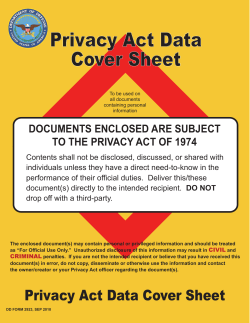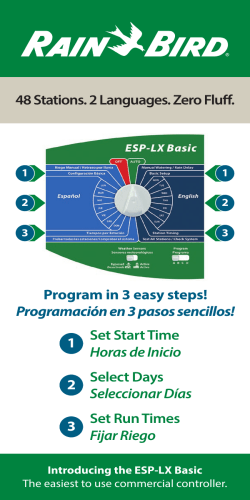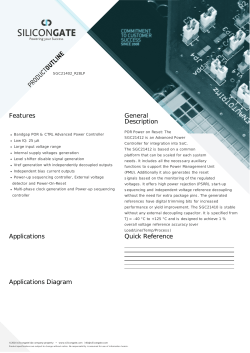
HIPSSA Project
HIPSSA Project Support for Harmonization of the ICT Policies in Sub-Sahara Africa Meeting with Data Protection Law Stakeholders 02 April 2013 PRESENTATION ON LESOTHO DATA PROTECTION LAW (TRANSPOSITION) Pria Chetty, International Legal Expert on Data Protection Adv. Kuena MOPHETHE Lesotho National Expert: Data Protection International Telecommunication Union Summary of the Content Background to Data Protection Law and Transposition Overview of National Assessment Transposition Process Overview of Data Protection Law including Transpositions Points for Discussion Purpose of Data Protection Law Harmonised approaches Give effect to right to privacy ICT technology developments impacts right to the protection of personal data in commercial activities as well as in electronic government (eGov) activities Illegitimate and unlawful monitoring of individuals Automated decision making Data protection regulation - ensure that the benefits of using information and communication technologies is not concurrent with weakened protection of personal data Model Law Development • Scan of international and regional approaches to data protection • Questionnaires to Member States • Desktop Research Review Data Protection Policy and Legal Analysis • Review of International and Regional Policies, Laws, Conventions • Comparison of common and differentiated approaches • Draft Model Law • Deliberated at workshop with country representatives • Incorporation of recommendations and requests for amendment • Model Law adoption Data Protection Model Law Objectives of SADC Model Law Give effect to principles of data protection Place limitations on the processing of personal data Provide for the rights of the data subject Describe the responsibilities of the Data Controller Establishment of the Data Protection Authority Combat violations of privacy likely to arise from the collection, processing, transmission, storage and use of personal dataactivities National Assessment Transposition Frames of Inquiry International and regional frameworks establish the primary themes, intent and functional requirements for data protection regulation. Within Lesotho, enquire: 1. Designated national data protection legislation 2. Prevalence of regulation that has a bearing on the right to privacy and protection of personal information in Lesotho. Transposition Frames of Inquiry Definitions Principles of personal information and sensitive information, of data protection Nature and functions of the Data Protection Regulator Regulation of Transborder Nature of the Constitutional right to privacy flows of personal information Privacy in Consumer Protection Privacy in Electronic Communications Rights of Access To Information versus the right to privacy Existing Data Protection Legal Provision The Lesotho Constitution, 1993; Lesotho ICT Policy, 2005 Communications Act, 2012; Data Protection Act, 2012; The Common Law; Labour Code Order of 1992; Prevention of Corruption and Economic Offenses Act of 1999; • Children’s Protection and Welfare Act of 2011; • Copyright Order of 1989 • • • • • • • The Lesotho Constitution Freedom of expression provides that: “Every person shall be entitled to, (except with his own consent) shall not be hindered in his enjoyment of, freedom of expression, including freedom to hold opinions without interference, freedom to receive ideas and information without interference, freedom to communicate ideas and information without interference (whether the communication be to the public generally or to any person or class of persons) and freedom from interference with his correspondence.” Interfered with only where it is in the interests of defence, public safety, public order, public morality or public health or other exceptions tabulated in the Constitution, including confidentiality in legal proceedings. The Lesotho ICT Policy, 2005 Strategies to be used in achieving the policy objectives include the enacting of a conducive legal environment and frameworks for ICT to thrive. The policy expresses a desire for Lesotho to attain best practices and to be a respectable member of the international community in the field of ICT Communications Act, 2012 The Act establishes the Lesotho Communications Authority and cloaks it with authority. In relation to the communications sector, the Authority has powers to: 5. (1) (n) require licensees to protect the privacy and integrity of user provided information; 22. (2) (e) Under competition safeguards, the Authority may pass rules that require a dominant licensee to disclose information about specific services to other licensees, the treatment of inter connection agreements and information contained therein. Data Protection Act, 2012 The Data Protection Act - entirely dedicated to the regulation, handling and processing of data. Establishes a Data Protection Commission. Principles - processing of personal data While protecting and recognizing the rights to protection of personal data, the Act also recognizes the need to reconcile the competing values of personal information privacy under the Act and sector specific legislation and other related matters. Labour Code Order Provision of employee information and other aspects that affect a worker at work. Provides that all employers must keep information relating to their employees as well as all reports, registers and particulars relating to any accident, industrial disease and dangerous incidences. Prevention of Corruption and Economic Offences Act In the course of any investigations into an offense to request any person to furnish information relating to any property held by him inside or outside Lesotho, and to require “any person to furnish, notwithstanding any law to the contrary, all information in his possession relating to the affairs of any person…” Child Protection and Welfare Act, 2011 This Act is meant for the protection of children and it prohibits the publication of the particulars or any information relating to a child appearing in court proceedings. Copyright Order, 1989 The law protects authors of literary, artistic and scientific work. It protects the work from being broadcast, reproduced or duplicated. The protection is for the author’s lifetime and 50 years after his/her death. Conclusion of Assessment Lesotho does have data protection legal provisions. The Data Protection Act is a law that is both enabling and regulating the collection, processing, transmission, storage and use of personal data, and that the establishment of a Commission is to safeguard those protections. Legislation that have provisions removing protection from the data subject as in the case of the Prevention of Corruption and Economic Offences Act.. Provisions that are in conflict with the Model Law provisions which will need to be brought in line with the Model law – set out in the conflicts matrix. DATA PROTECTION ACT (BILL) Approach to Transposition Harmonisation and clarity of definitions (includes automated processing) Definition of sensitive information Additional provisions pertaining to the Commission Revised Transborder Approach Provide for Accountability of Data Controller Provide for Quality of Data Provisions Provide for Data Protection Officer PART I - PRELIMINARY Citation and commencement Interpretation Application of the Act Exemptions Sector specific legislation PART II Establishment of the Data Protection Commission Disqualification from office Functions of the Commission Tenure of office Allowances of the members of the Commission Funds of the Commission Audit of Accounts Protection of the Commission Duty of confidentiality PART III Processing of personal information Minimality Collection directly from the data subject Purpose specification and further processing limitation Retention of records Security measures on integrity of personal information Information processed by an agent of the data controller PART III Information processed by an agent of the data controller Security measures regarding information processed by an agent Notification of security compromises Quality of information Notification to the Commission and to the data subject Access to and challenges of personal information Correction of personal information Data controller to give effect to principles Prohibition on processing of sensitive personal information PART IV Exemption on data subject’s spiritual, religious or philosophical beliefs Exemption on data subject’s race Exemption on data subject’s trade union membership Exemption on data subject’s political affiliation Exemption on data subject’s health or sexual life Exemption on data subject’s criminal behaviour General exemption on sensitive personal information Authorisation by Commission Exemption for processing of personal data for historical, statistical and research purposes PART V Complaints Investigation by the Commission No action by the Commission Pre-investigations by the Commission Investigation proceedings by the Commission Matters exempt from search and seizure Parties to be informed of developments during and as a result of the investigation Enforcement notice Cancellation of an enforcement notice Reviews and appeals Civil remedies PART VI Unsolicited electronic communications Automated decision making Transfer of personal information outside Lesotho Notifications Codes of Conduct Offences and penalties Regulations Transitional arrangements Discussion Points Public and Private Bodies Processing Personal Information Sensitive Personal Information Transborder Flow of Communications: Member State Commission – Function and Powers Defining Personal Information information about an identifiable individual that is recorded in any form, including, without restricting the generality of the foregoing:(a)information relating to the race, national or ethnic origin, religion, age or marital status of the individual; (b)information relating to the education or the medical, criminal or employment history of the individual or information relating to financial transactions in which the individual has been involved; (c)any identifying number, symbol or other particular assigned to the individual; (d)the address, fingerprints or blood type of the individual; (e)the name of the individual where it appears with other personal information relating to the individual or where the disclosure of the name itself would reveal information about the individual; (f) correspondence sent to a data controller by the individual that is explicitly or implicitly of a private or confidential nature, and replies to such correspondence that would reveal the contents of the original correspondence; and (g)the views or opinions of any other person about the individual. Processing of Personal Information processing: refers to any operation or set of operations which is performed upon personal information, whether or not by automated means, such as obtaining, recording or holding the data or carrying out any operation or set of operations on data, including – (a) organization, adaptation or alteration of the data; (b) retrieval, consultation or use of the data; or (c) alignment, combination, blocking, erasure or destruction of the data Sensitive Personal Information “sensitive personal information” (a) refers to genetic data, data related to children, data related to offences, criminal sentences or security measure, biometric data as well as, if they are processed for what they reveal, personal information revealing racial or ethnic origin, political opinions, religious or philosophical beliefs, affiliation, trade-union membership, gender and personal information concerning the health or sex life of the individual (b) refers also to any personal information otherwise considered by Lesotho law as presenting a major risk to the rights and interests of the data subject, in particular unlawful or arbitrary discrimination. Limitations on Transborder Flow Member State with Harmonised Law recipient establishes that the data is necessary for the performance of a task carried out in the public interest pursuant to the lawful functions of a data controller legitimate interests of DS not prejudiced subject to conditions Necessity? What are the lawful functions of the data controller? Contractually specified? Limitations on Transborder Flow Non-Member State with Harmonised Law/ Third Countries adequate level of protection is ensured in the country of the recipient and the data is transferred solely to permit processing otherwise authorised to be undertaken by the controller subject to due diligence assessment and further conditions Due Diligence Assessment assessed in the light of all the circumstances surrounding the relevant data transfer(s), particular consideration to be given to the nature of the data, the purpose and duration of the proposed processing, the recipient’s country, the relevant laws in force in the third country and the professional rules and security measures which are complied with in that recipient’s country Commissioner Deeming establish the categories of processing for which and the circumstances in which the transfer of personal data to countries outside (i) Lesotho and (ii) SADC is not authorized Commissioner may authorize a transfer or a set of transfers of personal information to a recipient country outside Lesotho or SADC which does not in its laws ensure an adequate level of protection, if the controller satisfies the Commissioner that it shall ensure adequate safeguards with respect to the protection of privacy and fundamental rights and freedoms of the data subjects concerned, and regarding the exercise of the data subject’s rights such safeguards can be appropriated through adequate legal and security measures and contractual clauses in particular Thank You Questions? Pria Chetty ITU International Expert: Data Protection Mobile: + 27 83 384 4543 Email: [email protected] Adv. Kuena Mophethe Lesotho National Expert: Data Protection Tel: 22 31 4331 + 22 31 4331 Mob: 58 85 2284 + 58 85 2284 Fax: 22 31 4331 E-mail: [email protected]
© Copyright 2026











